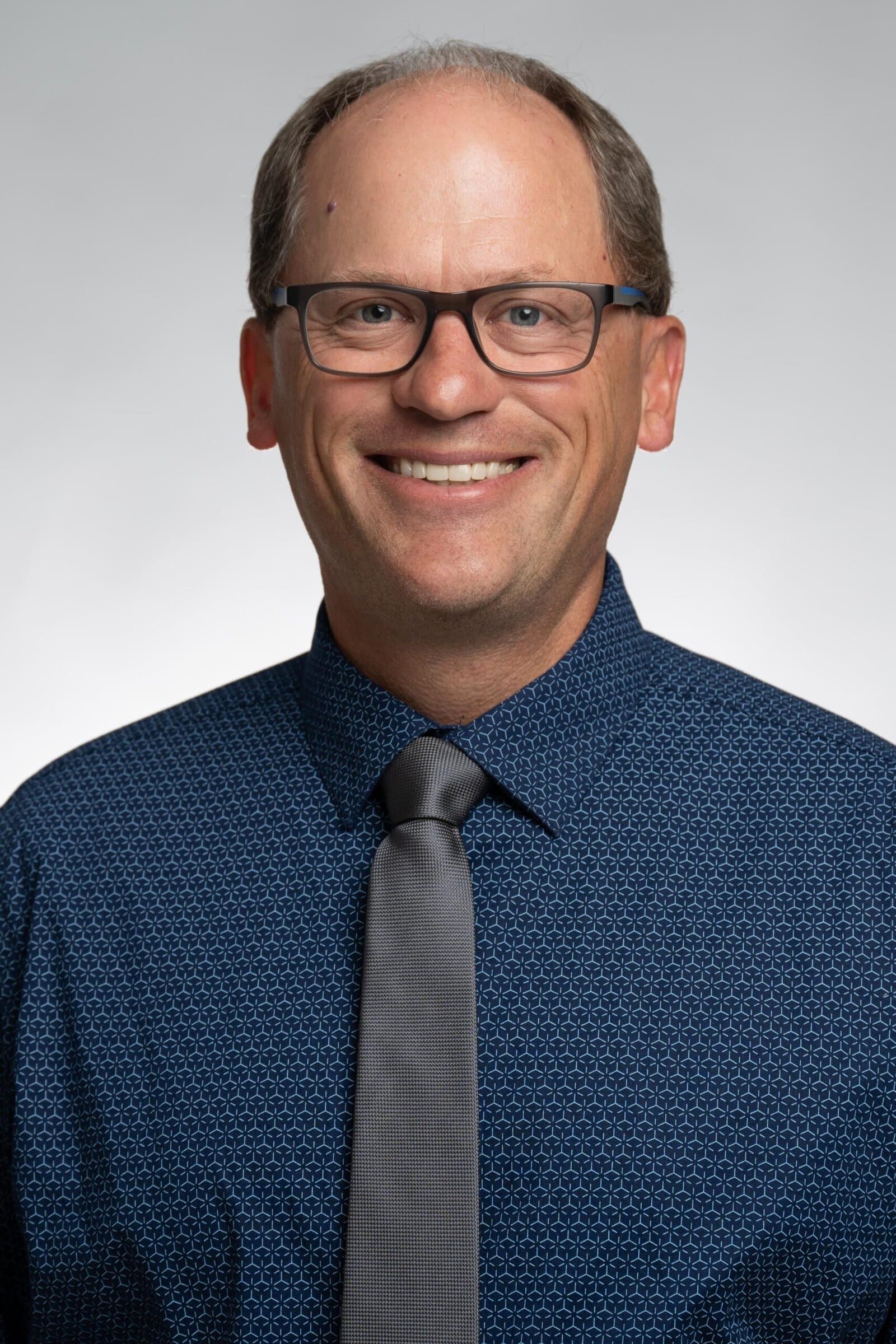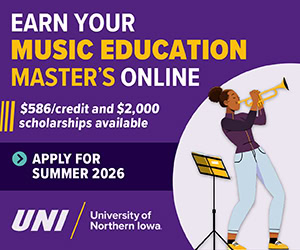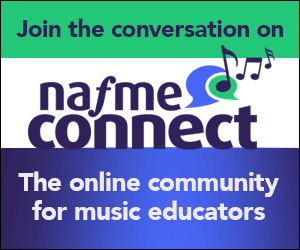
/ Membership / Meet Our Members / Paul Budde
What do you see as the major challenges music education will face during your term and in what ways can you transform these into opportunities during your presidency?
At present, I see three main challenges for our profession. First, we are in the midst of a national teacher shortage, which coincides with an erosion of public support for education in general. Sadly, music and the arts are often viewed as expendable when schools face budget cuts. Second, music educators face challenges in terms of literature selection (and more) based on societal and political pressures regarding appropriate themes and content. Third, there is a distinct divide between the music explored within schools and the music with which students engage outside of their music classrooms.
In each of these cases, we have an opportunity to shine a spotlight on the value of music, including how music can help us better understand ourselves as well as the world around us. Simply put, our society needs music now, more than ever. It’s upon all of us, as musicians and educators, to advocate for the value of music in our schools and within our communities. Along the way, we have an opportunity to broaden and expand music education in ways that foster the ideas of music for all people and music of all people.
Having served as President for the Wisconsin Music Educators Association (WMEA) during COVID (2020–22), I am keenly aware that there is no way to truly anticipate the challenges that will come about in the years ahead. That said, I am proud of the service and leadership that I was able provide as part of the leadership team during tumultuous times, and I feel confident in my ability to navigate the challenges that present themselves in the coming years.
What do you see as the major challenges the association will face during your term and in what ways can you transform these into opportunities during your NAfME presidency?
I believe strongly that the National Association for Music Education (NAfME) should focus on the challenges that music educators face within our profession. As such, the challenges described previously (e.g., the teacher shortage, societal challenges that impact music education in terms of literature selection and more, and the divide between the music explored within versus outside of music classrooms) should be front and center. I see opportunities for NAfME to engage in advocacy efforts, both in terms of local/grassroots efforts and national initiatives, in order to promote and support music education. Likewise, I see opportunities to expand efforts around NAfME’s A Blueprint for Strengthening the Music Teacher Profession initiative, particularly in helping music educators to embrace – and enact – changes that can move our profession forward.
An additional challenge that NAfME faces is fostering (and, in some cases, rebuilding) strong relationships between the association and state MEAs. I see this as a critical task for the NAfME leadership team in the months and years ahead. I believe that direct, honest conversations need to take place to learn how NAfME can grow in serving and partnering with state MEAs. Enacting changes, based on feedback provided by state MEAs, can build an even stronger NAfME.
How do you plan to advance equity/DEIA in NAfME during your term of office?
As described in my Equity Statement, I have experience advancing equity/DEIA in my current role as Music Education Coordinator at UW-River Falls as well as in my recent role as President for the Wisconsin Music Educators Association. Recognizing that all settings are unique, I see opportunities to use my experiences to help advance our profession. It is imperative that we expand opportunities for PK–12 students to engage with music in meaningful ways within their school settings, including through purposeful literature selection, expanded class offerings that make music accessible for all, student-centered approaches, and more. At the collegiate level, we need to remove barriers that prevent students from pursuing a degree in music/education. Likewise, we need to expand course and ensemble offerings, and we need to adjust degree requirements in order to better meet the needs of the students we serve.
Until we make substantive changes – across levels – that elevate and honor the ideas of music for all and music of all, equity/DEIA in our profession will remain elusive. I am proud of the work that I have done in this regard. I have seen and experienced the positive impacts of initiating such changes. I look forward to the opportunity to share my experiences and collaborate with others in order to help advance and expand our profession. There is work to be done – let’s do it, together!
Equity Statement
Music is a beautiful reflection of people and culture. As such, music education must include all people and all types of music. Unfortunately, our profession has long been entrenched in the hegemony of western art music – at the expense of other music. This reality can easily be seen when looking at who is in our music classrooms, students and teachers alike, as well as in the music we elevate through study and performance. It is long past time to change this paradigm.
It is critical that the leaders who guide our profession support the advancement of diversity, equity, inclusion, and access (DEIA). Simply put, all people should be valued and included in music classrooms, all people should be welcomed and supported in the profession of music education, and all styles of music should be embraced and celebrated within our classrooms.
As a profession, we need to eliminate barriers and open doors in order to ensure that music education meaningfully represents all people and all music. This shift is possible but requires strategic and sustained efforts from all of us. Eloquent words are not sufficient; rather, we must advocate for and enact changes that broaden and advance our profession.
As an educator and leader, I have engaged in work that moves our profession forward in this regard. As a member of the Wisconsin Music Educators Association leadership team, I was troubled by the homogenous nature of the WMEA Board and Council. As such, I led discussions that resulted in the addition of two Equity Chairs on the Executive Board, adding critical lenses and voices to the voting group of our leadership team. Likewise, I initiated discussions that resulted in the creation of a Disability and Accessibility Chair on the WMEA Council. Again, this chair position added an important lens and voice to our leadership team. Further, I raised awareness about how WMEA election protocols perpetuated the status quo in terms of electing a homogenous leadership team. As a result, we moved from board members nominating (and then voting on) future board members to protocols that allow all WMEA members to nominate candidates for the leadership team, a reality I hope will diversify the leadership team and bring new voices to the table.
As the Music Education Coordinator at the University of Wisconsin-River Falls (UWRF), I overhauled our music education degree, adding (among other things) World Music Ensemble, Adaptive Music, and Contemporary Topics in Music Education as required courses for our teaching candidates. I am currently engaging in conversations with my colleagues regarding changes to music theory, music history, and more in an effort to ensure that we honor and celebrate the music of all people. I initiated discussions that moved us away from traditional audition protocols and to our current Music Major Entrance Expos, which allow students to showcase their talents in a variety of ways; in addition to standard performance options (in which all musics are valued), students can complete their expo by sharing a video of themselves in a leadership role (e.g., leading a sectional or conducting at a concert), a composition or arrangement they created, or a multimedia file that showcases their creative output. Most importantly, these new protocols allow students to show us who they are as aspiring musicians and educators, rather than force them to conform to restrictive, traditional requirements. Finally, I serve on the Digital Access Committee, which is reviewing our website, online learning portals, course syllabi, and more in order to provide better access to all students, and I serve on a new committee that seeks to fulfill the University’s commitment to Indigenous Nations of our region, as stated in our strategic plan.
All of this is to say that I believe strongly in moving music education forward in a variety of ways connected to diversity, equity, inclusion, and access, and my beliefs have been put into action in ways that I hope will continue to advance our profession. Importantly, this work is not – and will never be – done. It is on all of us to move us ever closer to a brighter future, one in which all people – and all music – belong. Onward!
Leadership Statement
Leadership comes in many shapes and sizes. It can be spirited or soft-spoken. It requires conviction alongside open-mindedness. It includes individual work as well as collaboration. It requires timely actions as well as patience. It requires clear communication and careful listening. It requires enthusiasm and level-headedness. It entails steadfastness and malleability. It requires courage and vulnerability.
Leadership requires a vision for the future, including short and long-term goals. It requires recognition that the world is forever changing and, as such, necessitates flexibility and responsiveness. It requires the ability to organize, prioritize, and adapt. It requires careful planning as well as clear and timely communication. It requires a willingness to do the work.
Leadership is about empowering and lifting up others. It means giving voice to those who otherwise may go unheard and support for those in need. It requires looking out for the good of the whole and putting others before self. It means providing inspiration and modeling empathy. It involves deep reflection and grace. It means fostering hope and bringing people together.
Music education is among the most worthwhile and meaningful professions one could pursue. Music makes our lives – all of our lives – indisputably better. As such, every student deserves the opportunity to engage with music in meaningful ways as part of their educational journey, including through creating, performing, responding, and connecting with this profound art form.
The world we live in is filled with uncertainty and chaos. Strong leadership is a must to ensure that music education maintains its rightful place as part of a well-rounded education. Our students deserve nothing less, and our world needs music education now, more than ever.
As a teacher and leader, I am committed to moving our profession forward. To be certain, there are incredible positives to be found in music education as it has existed over many years. In fact, it was the life-changing experiences I had in high school that led me to pursue music education as a career. All the same, there are exciting opportunities to expand and diversify the profession, providing PK–12 students with new and meaningful ways to engage with music within their school settings through creating, performing, responding, and connecting. Simply put, I am deeply invested in finding ways to blend the best of traditional music education with forward-looking ideas that align with the ever-changing needs of the students we serve.
Leadership is challenging, but it is also deeply rewarding. I would be honored by the opportunity to serve students, teachers, and the greater music community in NAfME’s North Central Division. The future is bright – let’s embrace it, together!


